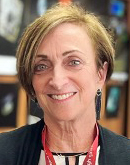The 10th ISAS Award (FY 2023)
We awarded the 10th ISAS Award to the following three individuals in January 2024. We at JAXA ISAS would like to express our deepest gratitude for the cooperation and support we receive from these external organizations and will continue to work toward further external collaboration.
| Recipient | Title |
|---|---|
| Dr. Fabio Favata | [Special Award] Contribution to the Deepening of Euro-Japan Cooperation Based on Understandings of ISAS features |
| Dr. Thomas Zurbuchen | [Special Award] Contribution to the Prosperity of U.S.-Japan Space Science Collaboration |
| Ms. Lillian S. Reichenthal | For Contribution to the XRISM Development and the Initial Operation |
Recipient Profiles
Dr. Fabio Favata

[Reason for award]
In recognition of your outstanding efforts to evolve the cooperative relationship between the ESA Science Directorate and ISAS with a deep understanding of the characteristics of the Japanese space science community, to contribute to the development of space science in Japan from recognizing the collaborative potential at BepiColombo leading to JUICE and innovative collaborations like the Comet Interceptor, and to present a crucial opportunity for Japan to participate in the exoplanet observation program ARIEL.
[Profile]
Fabio Favata is an astrophysicist who has done extensive research work in the field of the active stars and stellar formation, using mainly space based high-energy observatories, as well as ground-based telescopes. He obtained his degree in Physics from the University of Palermo (Italy) in 1985, following a period as research associate at the Harvard-Smithsonian Center for Astrophysics,. In the course of his research career he published over 150 refereed papers covering a range of topics, including stellar activity, stellar formation, Galactic structure, and Artificial Intelligence. His scientific production has received more than 6500 citations in the scientific literature.
He has worked from 1998 until 2023 for the Scientific Programme of the European Space Agency (ESA), initially as an active scientists, working at ESA’s technical center in the Netherlands. In 2008 he became responsible for the strategy, coordination and planning of the Scientific Programme of ESA, moving for a number of years to the Agency’s Headquarters in Paris, France. He was among other things responsible for defining the strategy of the Agency’s Scientific Programme, and for the interaction with the scientific community in Europe, with the 22 Member States of ESA and with the international partners (e.g., JAXA, NASA, Chinese Academy of Sciences, etc.).
During this period he has initiated a number of long-lasting collaborations between JAXA/ISAS and the ESA Scientific Programme in the field of space science missions, for example on XRISM, but also, more recently, for the Comet Interceptor mission.
He is currently associated with the International Institute of Space Science in Beijing and with the Italian National Astrophysics Institute, and continues to pursue research in astronomy and in science policy. He is also working with a number of private companies in the field of space systems.
Dr. Thomas Zurbuchen

[Reason for award]
In recognition of your remarkable accomplishments of making significant contributions to the development of the partnership between NASA SMD and ISAS. As the Associate Administrator for NASA's Science Mission Directorate, you exhibited remarkable leadership not only in successful launch of XRISM but also in fostering an international partnership in diverse missions, including MMX. These endeavors laid the foundation for the advancement of Japanese space science.
[Profile]
Dr. Thomas H. Zurbuchen is a professor and leader of the Space Programs at ETH Zurich, in Switzerland. Known in the space community as “Dr. Z,” he is the longest continually serving head of science at NASA, a post he held from 2016 to 2022. As NASA associate administrator for the Science Mission Directorate, he was responsible for all aspects of NASA leadership in space science. During his tenure, NASA launched 37 science missions and started 54, including the James Webb Space Telescope, two Mars landings, the Ingenuity helicopter, the Parker Solar Probe, and the DART mission. Zurbuchen also conceived and led the Earth System Observatory, an advanced multi-platform observatory that creates a 3D holistic view of the Earth, from bedrock to atmosphere.
He has a MS and PhD of physics/astrophysics from the University of Bern and as a Professor worked at the University of Michigan as a researcher, teacher and innovator for two decades. He was the founder of the award-winning Center for Entrepreneurship there which achieved top rating within the US for their educational and experiential programs. He is a member of the Swiss Academy of Engineering Sciences, recipient of the NASA Outstanding Service Medal, associate fellow of the American Institute of Aeronautics and Astronautics, and recipient of the Presidential Rank Award, Distinguished Level. He is a winner of the excellence in international cooperation award of the International Astronautical Federation (IAF), and has received multiple honorary doctorates.
Ms. Lillian S. Reichenthal

[Reason for award]
In recognition of your outstanding leadership to the team as the NASA project manager for XRISM a joint project between JAXA and NASA, and of your great contribution to the development of the satellite and onboard mission instrument and the initial on-orbit operations. Through your leadership, we have overcome difficulties not only in science and technology but also in the coronavirus pandemic through careful coordination with related parties, detailed preparation, and excellent teamwork with the JAXA project.
[Profile]
Ms. Lillian Reichenthal is the NASA project manager for the X-Ray Imaging and Spectroscopy Mission (XRISM) at the NASA Goddard Space Flight Center.
During her career, Reichenthal has been involved in many of NASA’s science satellites spanning astrophysics, heliophysics, and planetary missions. She began her career working as an electrical engineer on the Hubble Space Telescope first servicing mission and the Wilkinson Microwave Anisotropy Probe (WMAP). Reichenthal served as Instrument Manager for the STEREO mission, Executive Officer of the Mars Exploration Program at NASA Headquarters, and as Deputy Program Manager for the Joint Polar Satellite System (JPSS). In collaboration with JAXA, she supported the Tropical Rainforest Measuring Mission (TRMM) satellite and the Fast Plasma Investigation (FPI) instrument suite for the Magnetospheric Multiscale (MMS) mission, in addition to her current role on XRISM.
Reichenthal earned her bachelors of science degree in Electrical Engineering from the University of Maryland in the United States.
Her honors include receiving the 2020 NASA Agency Honor Award for Exceptional Achievement and 2021 NASA Agency Honor Award for outstanding leadership.
